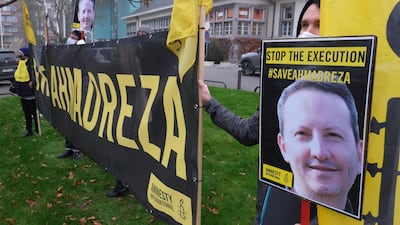The execution of an Iranian-Swedish academic in Iran has been postponed for a "few days," rights group Amnesty Sweden said, following an outcry in Europe.
Ahmadreza Djalali, 49, who was sentenced to death three years ago, accused of spying for the Israeli intelligence agency Mossad, remains at "great risk" but will not be executed on Wednesday as had been feared.
His wife had been told he would be moved on Tuesday afternoon to a prison where executions are routinely carried out but the rights group said he was still at Tehran's Evin jail.
"The situation is still acute! There is still a great risk that the execution will be carried out," the group said on Twitter.
His wife, Vida Mehrannia, had called on Europe’s most powerful figures to intervene on his behalf before Iran carried out the sentence.
European officials believe Mr Djalali is a pawn in a broader political game.
The apparent postponement came after the EU’s foreign policy chief Josep Borrell spoken to his Iranian counterpart Javad Zarif.
He made no mention of Mr Djalali’s case in a tweet about the meeting but Mr Borrell last week put his name to a joint letter with rights groups calling for immediate action to stop the execution.
Mr Djalali, 49, formerly based in Sweden, was arrested during a visit to Iran in April 2016 and sentenced to death 18 months later.
He was found guilty of passing on information about two Iranian nuclear scientists to Mossad that had led to their assassinations.
Mr Djalali is an expert in disaster medicine and worked at the Karolinska Institute, a medical university in Stockholm.
He was granted Swedish citizenship in February 2018, while in prison.
Mr Djalali says he is being punished for refusing to spy for Iran while working in Europe.
His case has been linked to the current trial of suspected Iranian spymaster Assadollah Assadi in Belgium, who is accused of plotting to bomb a rally of dissidents in Paris in 2018.
Prosecutors have called for a 20-year sentence for Mr Assadi. He denies the charges and has refused to appear before the court in Antwerp, citing diplomatic immunity.
Fears over Mr Djalali’s plight grew following the killing last week of Iran’s top nuclear scientist Mohsen Fakhrizadeh, in a suspected Mossad assassination operation.
The UN’s special rapporteur on extrajudicial executions, Agnes Callamard, said the impending execution of Mr Djalali was unlawful and unconscionable.
“The ‘judge’ overseeing the arbitrary killing reportedly said the family would be granted a last visit before his execution,” she said on Twitter.
“Unconscionable. And unlawful. Human lives, just pawns in international politics, tit for tat.”
Mr Djalali had been due to be transferred to Rajai Shahr prison in Karaj, 50 kilometres northwest of Tehran, yesterday.
Mahmood Amiry-Moghaddam, director of the Iran Human Rights group, said: “Ahmadreza Djalali is at imminent risk of execution and only a strong and urgent reaction from the international community can save his life.”
Sweden’s foreign minister Anne Linde went public with her concerns last week that the execution was imminent after contacting her Iranian counterpart, Javad Zarif. Tehran responded by sounding a warning against all interference from Sweden.
Iran has been accused by families of detainees of falsely imprisoning foreigners and dual citizens to exert pressure on governments to secure its foreign policy goals.


